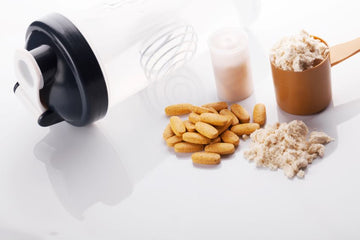Athletes are obliged to take care of their diet every day in order to obtain the performance they want. That is why nutrition is gaining more and more weight in sports science. Following an alkaline diet is just one more formula that can be implemented to achieve these good results, but for this it has to be well designed and add other appropriate habits.
What is an alkaline diet
If you have ever heard of it, it is because you have wondered what an alkaline diet is. It is very likely that this regime sounds familiar to you because it is a trend and has been popularized by great celebrities around the world. In the field of sport it is also very popular.
The alkaline diet for athletes is based on foods that leave high concentrations of minerals once they are digested. The main idea behind these eating habits is that many diseases develop in an acid environment (with a basic pH), so the best way to prevent them is to "alkalize" the body. Food is a good formula to achieve this purpose.
The defenders of this diet affirm that adopting it helps to detoxify the organism, lose weight and prevent diseases . The interest that the topic of alkalizing the body through food has gained plays an extra role in athletes, since the extra effort to which they submit their body implies greater acidification.
Those efforts are dehydration, physical tension, electrolyte imbalances and even the intake of foods very rich in protein. All people need to maintain a regulated, stable pH level that remains constant between 7.34 and 7.45. When it drops below the minimum level, acidosis can occur ; and if it rises above 7.45, excessive alkalinization occurs.
All metabolic processes that occur in the body generate acid metabolites . In the case of athletes, moreover, this process is more pronounced, since metabolic stress is more intense. And a body that is too acidic promotes an internal environment that is very prone to the development of infectious or autoimmune diseases.
What is an alkaline diet and what should you eat?
The basics of an alkaline diet indicate that it is possible to avoid the appearance of various diseases by reducing the intake of acidifying foods. In the field of sport, this idea has gained strength due to the high metabolic stress suffered by many athletes.
However, the scientific community does not show truthful contributions regarding this diet, since it has not been proven that alkaline foods can reduce the risk of suffering from diseases.
In general terms, this nutritional plan is committed to consuming 80% alkalizing foods and 20% neutral or slightly acidifying foods. As for what an alkaline diet is like if you follow it to improve physical performance, the answer is simple, foods rich in minerals, of plant origin and that provide a large amount of antioxidants, enzymes and phytonutrients.
Foods of animal origin , which are rich in protein , leave a much higher acid residue load once they are digested, but they cannot be renounced either, since the diet must be complete and balanced.
Calcium and magnesium, essential in an alkaline diet for athletes
Of all the products that can be consumed in a diet of this type, there is a group called superalkaline foods . All of them are very rich in minerals and vitamins and are of vegetable origin: peppers, spinach, avocado, celery, broccoli, cucumber or kale cabbage are within this section.
They are characterized by their content in these nutrients and because they are very rich in water, purifying and help regulate the balance between calcium and magnesium . These two minerals are essential for bone and muscle development in sports nutrition.
The typical western diet suffers from an excess of calcium consumption but with insufficient contributions of magnesium . This last mineral is crucial for the absorption and use of calcium, to increase metabolic efficiency, oxygen consumption , strength, power and muscular endurance.
Too much calcium and not enough magnesium in Western diets
Approximately 70% of people do not consume the recommended daily amount of magnesium . This is especially dangerous in the case of athletes, who lose this mineral through sweat at a much faster rate. The intake of super-alkaline foods is a highly recommended practice in an alkaline diet. If this is not possible, another solution is to resort to nutritional supplementation.
Best Isotonic from Scenit Nutrition is perfect for recovering the ions lost through sweat during exercise. It is a powerful rehydrating agent for during and after exercise. This product can be consumed by anyone who practices intense exercise or who is regularly subjected to high temperatures.
Magnesium is not only an essential mineral due to its alkaline nature, but it is also necessary because it is involved in muscle function. In fact, many recovery supplements include this compound as a component. That is the case of HMB XT 3000 , whose mission is to prevent muscle catabolism and loss of mass after intense wear.
The consumption of nutritional supplements to alkalize the diet has expanded in recent years for a clear reason, modern agricultural practices and the use of herbicides, pesticides and commercial fertilizers are "acidifying" many plant foods.
Scenit Nutrition has a wide range of products whose basic principle is to complement the diet, but never act as a substitute agent. Some of them are generic and can be consumed by all kinds of people, regardless of their physical condition. This is the case, for example, of MultiVit , which offers an extra supply of nutrients to improve basic metabolic functions.
Alkaline diet menu, staple foods
Beyond the superalkalines, the basis of a diet of this type is based on the rest of the green vegetables, almonds, potatoes, algae and carrots . In turn, it is important to complement the intake of these products with other neutral or slightly acidic foods. Legumes , which are rich in vegetable protein, sweet fruits, citrus fruits and many cereals appear in this group .
Acidifying foods should be consumed to a lesser degree . This selection includes red meat, chicken, shellfish, fish, eggs and dairy products. In any case, it is important not to give up these foods completely , since the diet, alkaline or not, must be complete and balanced, with a very high nutritional content.
Risks of this diet
The alkaline diet should not be carried out by people with diabetes , kidney failure or growing children who require dairy intake. The important thing when following this nutritional process is to control food intake well, so as not to reach situations of nutritional deficiency.
If the typical Western diet is richer in calcium than in magnesium, and the idea of alkalizing tries to equalize this balance, this should not lead to abandoning the consumption of calcium. In general, the alkaline diet is based on the consumption of fruits and vegetables and reducing those foods that induce acidosis.
When this phenomenon occurs, the body's cells lose the ability to capture oxygen from the blood and the accumulation of lactic acid and free radicals increases . Another consequence of acidosis is the extraction of calcium and magnesium from the bones , which leads to a depletion of these minerals and less energy needed to overcome great physical efforts.
What are the benefits of an alkaline diet for athletes?
The alkaline diet for athletes adds the benefits that this type of diet implies at a general level with positive properties for those who lead a very active lifestyle and a very intense level of physical activity.
Thus, among the most notable general issues appears the ability to prevent osteoporosis . When the organism is acidified, it goes to the calcium reserves in the bones. This causes loss of their density and more options to produce osteoporosis.
In turn, consuming foods that increase the alkalinity of the pH in the urine improves the secretion of growth hormone and thereby reduces cardiovascular risk and improves the secretion of hormones through the action of magnesium.
The presence in this diet of many fruits and vegetables also implies a massive intake of potassium, a mineral that offsets the effect of sodium , which is acidifying and is related to episodes of arterial hypertension.
Going specifically to athletes, the alkaline diet induces better muscle recovery after training, a more comfortable and pleasant rest and greater vitality in daily activities . Similarly, the consumption of many fruits and vegetables is associated with better oxygenation and greater physical performance.
This diet, which is under constant review, should only be promoted under the prescription of a specialist , to introduce foods that suit the lifestyle and level of training.
The alkaline diet aims to maintain a correct pH balance in the body. Metabolic processes acidify the aqueous media in which the cells of our body develop and this situation is aggravated in athletes. Combating this phenomenon is the idea behind this diet.





